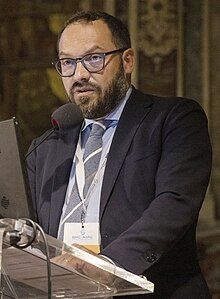Draft:Luca Lantero
| Submission declined on 13 December 2024 by BuySomeApples (talk). This submission's references do not show that the subject qualifies for a Wikipedia article—that is, they do not show significant coverage (not just passing mentions) about the subject in published, reliable, secondary sources that are independent of the subject (see the guidelines on the notability of people). Before any resubmission, additional references meeting these criteria should be added (see technical help and learn about mistakes to avoid when addressing this issue). If no additional references exist, the subject is not suitable for Wikipedia. This submission appears to read more like an advertisement than an entry in an encyclopedia. Encyclopedia articles need to be written from a neutral point of view, and should refer to a range of independent, reliable, published sources, not just to materials produced by the creator of the subject being discussed. This is important so that the article can meet Wikipedia's verifiability policy and the notability of the subject can be established. If you still feel that this subject is worthy of inclusion in Wikipedia, please rewrite your submission to comply with these policies.
Where to get help
How to improve a draft
You can also browse Wikipedia:Featured articles and Wikipedia:Good articles to find examples of Wikipedia's best writing on topics similar to your proposed article. Improving your odds of a speedy review To improve your odds of a faster review, tag your draft with relevant WikiProject tags using the button below. This will let reviewers know a new draft has been submitted in their area of interest. For instance, if you wrote about a female astronomer, you would want to add the Biography, Astronomy, and Women scientists tags. Editor resources
|  |

Early Life and Education
[edit]Luca Lantero was born in Italy. He is an Associate Professor at the European Public Law Organization (EPLO), he earned an Integrated Master’s Degree in Law from the Catholic University of Milan (Università Cattolica del Sacro Cuore di Milano) and a PhD at the European University of Rome (Università Europea di Roma).
Career
[edit]Since 2015, Luca Lantero has held the position of Director General at CIMEA (Information Centre on Academic Mobility and Equivalence) in Rome, Italy. Over his career, Luca Lantero has become a recognized expert in educational sectors at both the national and international levels, particularly in higher education, vocational education and training, and adult education. His work spans the coordination and strategic development of various national and international projects, mobility programs, and strategies related to academic and professional recognition.
Academic Career
[edit]Luca Lantero has been a member of numerous scientific and doctoral boards. His teaching covers topics such as higher education systems, internationalization strategies, and the application of artificial intelligence and digital solution in education.
Institutional Roles
[edit]Luca Lantero holds significant roles in numerous international education organizations. He serves as the President of the Lisbon Recognition Convention Committee Bureau, an entity established by UNESCO and the Council of Europe, and as Vice-President of the Council of Europe’s Platform on Ethics, Transparency, and Integrity in Education (ETINED). Additionally, he is the Head of the ASEM Education Secretariat, facilitating cooperation between Europe and Asia in education. He is President Emeritus of the Italian Professional Association of Credential Evaluators (APICE).
Luca Lantero is actively involved in Italian education diplomacy, representing Italy in various educational forums, including the Bologna Follow-Up Group (BFUG) for the European Higher Education Area, the G20 Education Group, and the European Education Area. He has also served as a consultant to the Italian Ministries for Universities and Research for international education strategy.
He is currently an Associate Professor at the European Public Law Organization (EPLO) and Director of the Institute for Higher Education Law and Governance (IHELG).
Contributions to Education and Credential Evaluation
[edit]Luca Lantero has contributed to numerous projects and initiatives aimed at improving transparency and integrity of academic sector.
He has introduced in the Italian system the possibility for universities to organize and issue the foundation course, he has implemented the evaluation recognition methodology in Italy and he has contributed to the development of the professional profile of “credential evaluators” at national level. His work includes coordinating projects like DiploME, which uses blockchain for credential verification, and FraudSCAN, a database for detecting false academic records. He has been instrumental in developing policies for credential recognition for refugees and individuals with insufficient documentation.
As a blockchain expert in higher education, Luca Lantero has explored innovative methods for credential verification and transparency. He is also President of CIMEA Academy, and serves on the editorial board of “Universitas” magazine.
Publications
[edit]Luca Lantero is a prolific author, with numerous publications focused on higher education, credential evaluation, and academic recognition. Some of his key publications include:
- Artificial Intelligence and Recognition of Qualifications: Opportunities and Risks from an ENIC-NARIC Perspective (2023)
- The Lisbon Recognition Convention Monitoring Report (2022)
- Etica e Università, ed. Vita e Pensiero (2022)
- National Guidelines for the Recognition of Foreign PhDs in Italy (2022)
- Guidelines on Fast-Track Recognition of Ukrainian Academic Qualifications (2022)
- Micro-credentials and Bologna Key Commitments: State of Play in the European Higher Education Area (2021)
- Guide on Diploma Mills and Other Dubious Institutions (2018)
His writings provide guidance on topics such as document fraud, joint degree recognition, and the impact of COVID-19 on education and mobility.
Legacy and Impact
[edit]Through his leadership roles and published works, Luca Lantero has made substantial contributions to the fields of credential evaluation, ethics in education, and international academic mobility. His expertise has informed policies and practices that have enhanced the integrity and recognition of academic qualifications globally, fostering cross-border educational and professional mobility.
